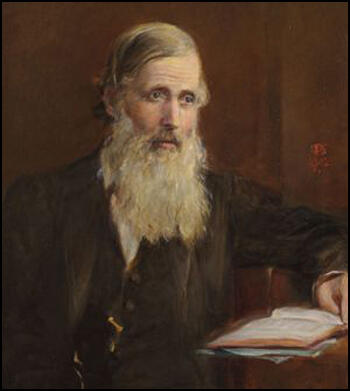Henry Sidgwick
Henry Sidgwick, the third son of Reverend William Sidgwick and Mary Crofts was born in Skipton, Yorkshire on 31st March 1838. After the death of his father in 1841, the family moved to Bristol. He was educated at Rugby School and Cambridge University where he became a fellow of Trinity College. At first Sidgwick's main interest was moral philosophy but under the influence of John Stuart Mill, he turned to political economy.
Initially Sidgwick found Mill's views on women's rights as "violently radical" but was gradually won over. By 1867 he had joined Josephine Butler and Ann Jemina Clough in their struggle to obtain special university examinations for women.
In 1871 Sidgwick established Newnham, a residence for women who were attending lectures at Cambridge University. His fellow campaigner, Anne Jemina Clough, was invited to become principal and eventually Newnham College had its own tutorial staff.
Whereas Emily Davies at Girton College insisted that her students studied the same subjects as men and be expected to pass similar exams, at Newnham, Anne Jemina Clough and Sidgwick devised special courses for its undergraduates. Sidgwick also opposed the teaching of Greek and Latin, which formed a necessary preliminary for a degree at Cambridge University. Sidgwick had argued for a long time that classics had dominated boy's secondary education and he did not want the same thing to happen to girl's education.

In his book Methods of Ethics (1875), Sidgwick attempted to develop the utilitarian theories of John Stuart Mill. The following year Sidgwick married Eleanor Balfour, the sister of Arthur Balfour, the future British Prime Minister. Eleanor had been involved with the developments at Newnham College for several years and in 1880 became its vice-principal.
In 1881, Sidgwick campaigned, with success, for the admission of women to examinations at Cambridge University. However, he resigned from the University Council in protest at their refusal to grant degrees to women. Henry Sidgwick died of cancer on 28th August 1900.
Primary Sources
(1) In her book on Anne Clough, Blanch Athena Clough explained how in the early 1870s Henry Sidgwick gradually persuaded teachers at Cambridge University to allow women to attend their lectures.
By 1873 twenty-two out of the thirty-four professors of the university granted formal leave to women students to attend their lectures, and a few years later this twenty-two had grown to twenty-nine. In the case of several of the professorial lectures there were special reasons against opening them to women, and, in particular, the admission of women to the medical lectures was not asked for either at that or any later time.
Gradually, also, women were admitted to lectures given in college halls or lecture rooms. St. John's College, even as early as 1871, permitted one of its lecturers, Mr. Main, to give instruction to women students in the chemistry laboratory of the college, and this Mr. Main constantly did, usually at an early hour, such as 8.30 a.m. before lectures to undergraduates began.
(2) In 1897 Henry Sidgwick was interviewed about how Newnham College was established.
When, in accordance with the general plan formed in 1870 for developing the system of lectures for women in Cambridge, it became necessary to find a lady to preside over the house destined to receive external students, my first idea was to ask Miss Clough; and though her refusal for a time turned my thoughts into other directions, I never doubted that her acceptance of the post would be the best possible thing for the new institution.
My desire for her co-operation was partly on account of her long devotion to the improvement of the education of women; but it was partly due to the fact that I thought she would be in special sympathy with the plan on which the work at Cambridge to be conducted.
(3) Mary Paley was one of the first students to join Newnham College in October 1871.
In October 1871, Mary Kennedy, Ella Bulley, Edith Creak, Annie Migault, and I came to be with Miss Clough, and in the following term we were joined by Felicia Larner, and one or two others. We lived very much the life of a family; we studied together, we had our meals at one table, and in the evening we usually sat with Miss Clough in her sitting-room. We did our best to keep down household expenses: our food was very simple; we all, including Miss Clough, not only made our beds and dusted our rooms, but we helped to wash up after meals, and we did the domestic sewing in the evening.
I believe we were all hard-working and well-intentioned, but during that first year there was a good deal of friction between Miss Clough and some of us. I think we were almost entirely to blame, and I never cease to be astonished at our want of appreciation in those days. We did not understand her at all. I believe if she had had more weaknesses and limitations, we should have liked her better. We failed to see the great outlines of her character, her selflessness, her strong purpose, her extraordinary sympathy. She had some obvious faults of manner, and these we did see and probably exaggerated. She did not dress well, and she had a certain timidity and irresoluteness.
The venture of women's education in Cambridge was a new one: she was, I think, a little afraid of us, and did not know what we might do next. She had not had much to do with girls of our age before, and perhaps she treated us too much like schoolgirls. She did not quite enter into our notions of fun: perhaps she took things a little too seriously, and so she did not gain our full confidence in those early days.

